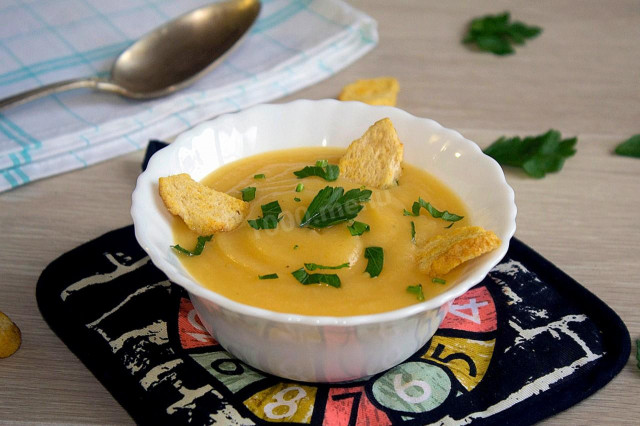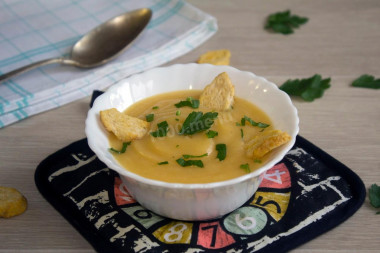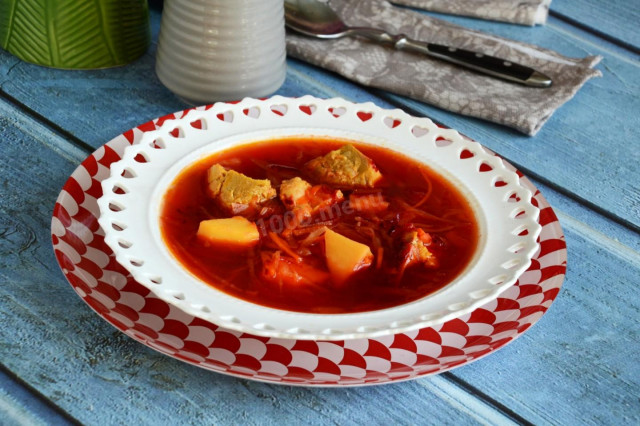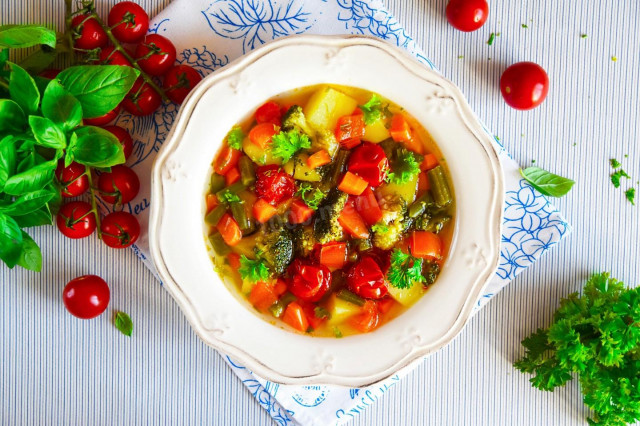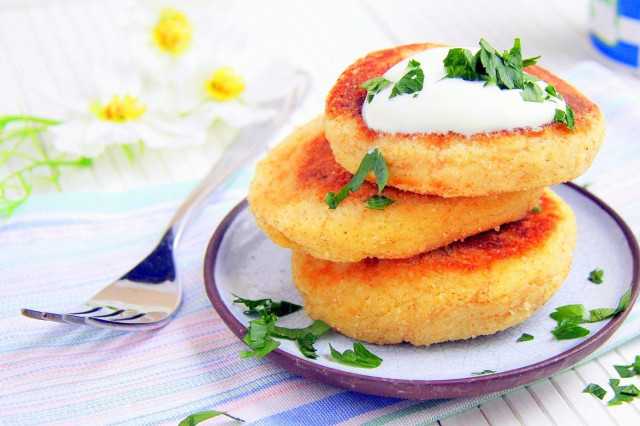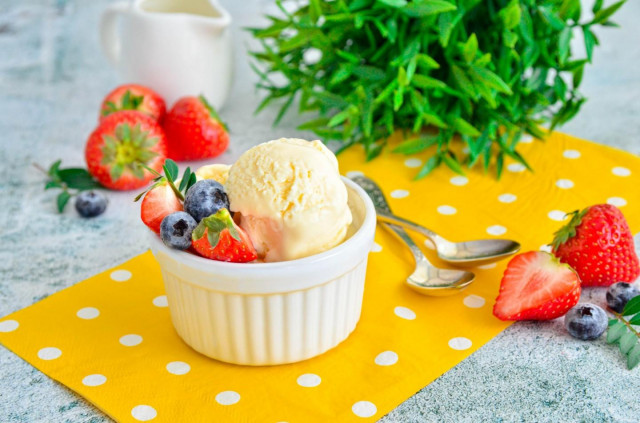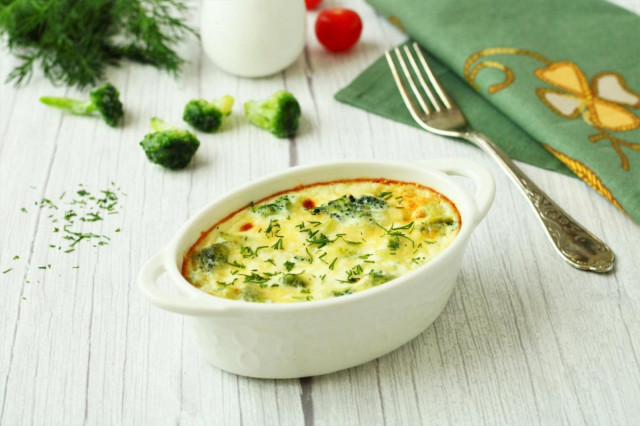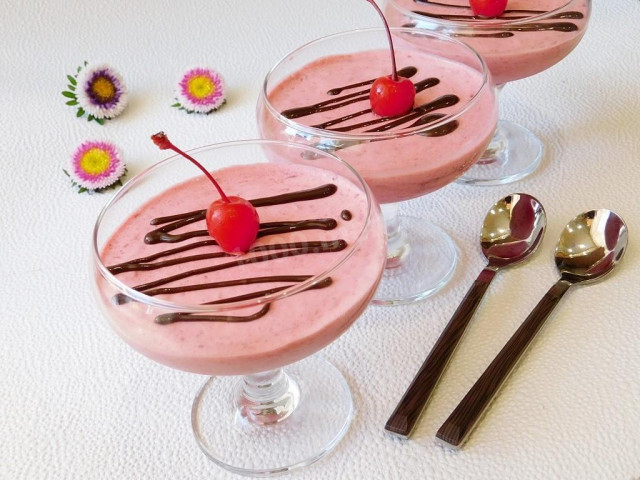Composition / ingredients
Step-by-step cooking
Step 1:
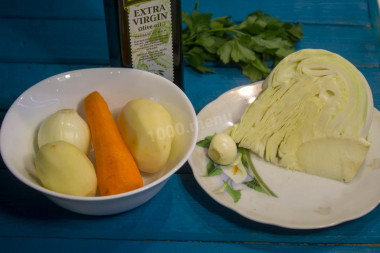
How to cook mashed cabbage soup? Prepare all the products listed in the list. Take one small onion and carrot, three medium-sized potatoes, peel 1-2 cloves of garlic. Cut off a third of a head of white cabbage. Return the rest to the refrigerator for storage.
Step 2:
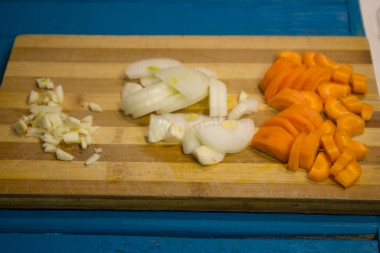
Wash and peel onions, carrots and a large clove of garlic. Cut them into any shape, but not very finely, we will still turn them into mashed potatoes later. If desired, add celery (2-3 stalks), parsley root and parsnips. The dish will be even healthier, and its taste is more intense.
Step 3:
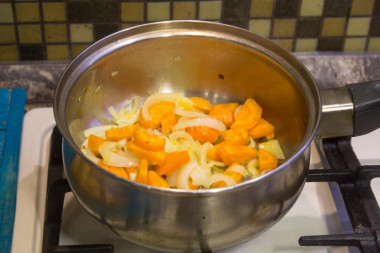
In a frying pan with a thick bottom (or a saucepan), heat the olive oil with a high smoking temperature. Pass the carrots and onions over moderate heat for 2-3 minutes. Be sure to stir. The carrot should become soft and the onion transparent. Remove from the heat. During the browning, the vitamin A contained in the carrot will dissolve in fat. In this form, it will be better absorbed and will give the soup a beautiful color. And substances with a pungent smell and taste will be removed from the onion.
Step 4:
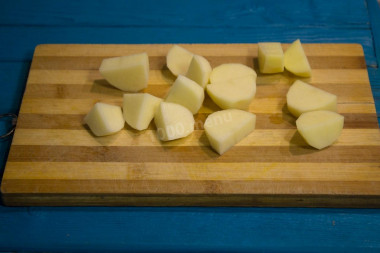
While the vegetables are frying, peel the potatoes. Cut it into medium-sized slices.
Step 5:
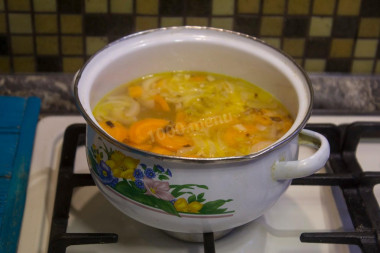
Pour water into a saucepan. It is important to use filtered, not tap water. The taste of the dish will largely depend on this. Put it on the stove and turn on a strong fire. When it boils, reduce the heat to medium and place the fried vegetables in a saucepan. Mix it up.
Step 6:
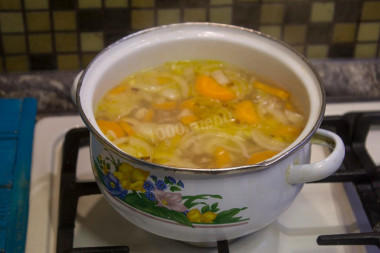
Since potatoes cook longer than cabbage, add it to the soup first. Cook over low heat for about 15 minutes. The finished potatoes should be easily kneaded with a spoon.
Step 7:
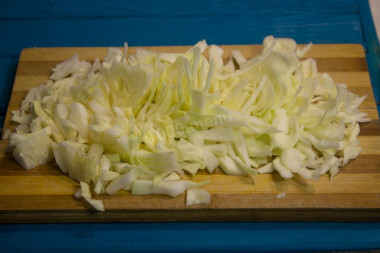
While the potatoes are cooking, coarsely chop the white cabbage.
Step 8:
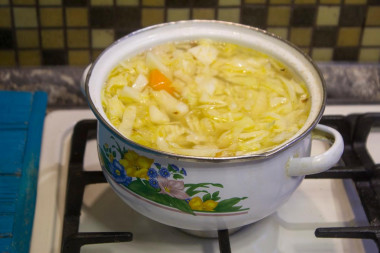
Add the cabbage to the rest of the vegetables. Cook until it becomes soft. It is important to remember that the slower and calmer the soup boils, the tastier it will turn out.
Step 9:
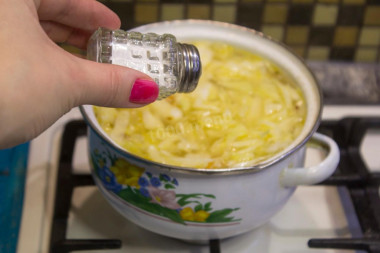
Add salt. Mix it up. I advise you to add a little salt first (a third of a tablespoon). Then try and add salt if necessary. After all, it is better to under-salt than over-salt.
Step 10:
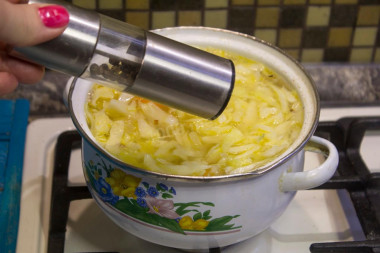
Pepper. Be sure to try it. Adjust the taste as you see fit. Reduce the heat. Cook at a low boil for about 20-25 minutes. When cooking, watch the soup. Do not allow it to boil violently. It is better that he languishes on low heat.
Step 11:
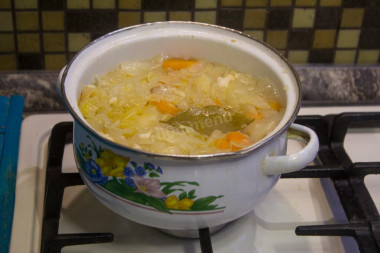
Add the bay leaf at the end of cooking. Turn off the fire. Let the soup brew under the lid for about 5 minutes.
Step 12:
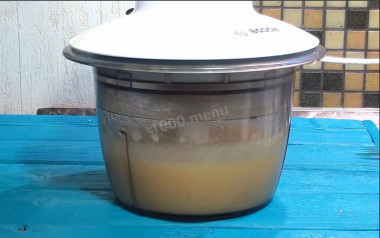
Take out the vegetables with a slotted spoon and transfer them to the bowl of a blender. Pour in a little vegetable broth. Grind the contents into a puree and return back to the pan. If you don't have an immersion blender, use a regular potato masher. Pureing should happen quickly, otherwise the soup will cool down.
Step 13:
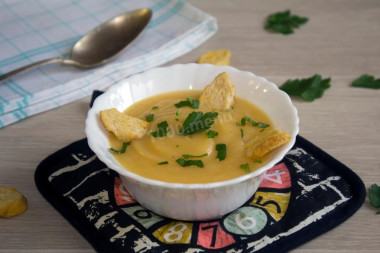
Pour the mashed soup on plates. Sprinkle chopped fresh herbs (parsley, dill, green onion) on top. Serve the first course hot. Enjoy your meal!
Vegetable soup-puree of white cabbage turned out to be tender, dietary, creamy. The recipe can be supplemented with other vegetables (bell peppers, string beans, tomatoes, etc.). In this case, take into account the cooking time of each vegetable. If desired, put croutons in the finished soup. To cook them, cut the white bread into small cubes. Fry until golden brown in well-heated refined olive oil. Put the crackers on paper towels to remove excess fat. Also, for a more pleasant taste, you can add 1 teaspoon to a plate. sour cream, natural yogurt or cream.
How to choose the perfect pot for soup, porridge or pickling cucumbers read the article about pots.
If you use ready-made spice mixes, be sure to read the composition on the package. Often, salt is already present in such mixtures, take this into account, otherwise you risk over-salting the dish.
Important! Regardless of whether the amount of water for soup is indicated in the recipe or not, it is best to focus on your own preferences (thick or more liquid soup you like), as well as on the size of your pan and the products taken for cooking. Do not forget that the author has his own view on the amount of meat, potatoes, cereals and other ingredients in the soup, which may not coincide with yours. In practice, this means that if you are cooking for the first time, you should not cook a whole pot at once. Make a soup for tasting - for one or two people. To do this, reduce the amount of all ingredients according to the recipe to 1-2 servings, and take the amount of water from the calculation: from one cup per serving - if the soup is very thick, to 1.5-2 cups - if more liquid. Do not forget to take into account that part of the liquid will boil off during the cooking process. After tasting a small portion of soup, you can adjust both the amount of liquid and the proportions of ingredients to your taste. In the future, like most experienced housewives, you will be able to pour water for soup and lay the ingredients “by eye".
Caloric content of the products possible in the composition of the dish
- Ripe potatoes - 80 kcal/100g
- Baked potatoes - 70 kcal/100g
- Mashed potatoes - 380 kcal/100g
- Boiled potatoes - 82 kcal/100g
- Potatoes in uniform - 74 kcal/100g
- Fried potatoes - 192 kcal/100g
- Carrots - 33 kcal/100g
- Dried carrots - 275 kcal/100g
- Boiled carrots - 25 kcal/100g
- Garlic - 143 kcal/100g
- Bay leaf - 313 kcal/100g
- Ground black pepper - 255 kcal/100g
- Water - 0 kcal/100g
- Onion - 41 kcal/100g
- White cabbage - 28 kcal/100g
- Boiled white cabbage - 21 kcal/100g
- Olive oil - 913 kcal/100g
- Table salt - 0 kcal/100g

